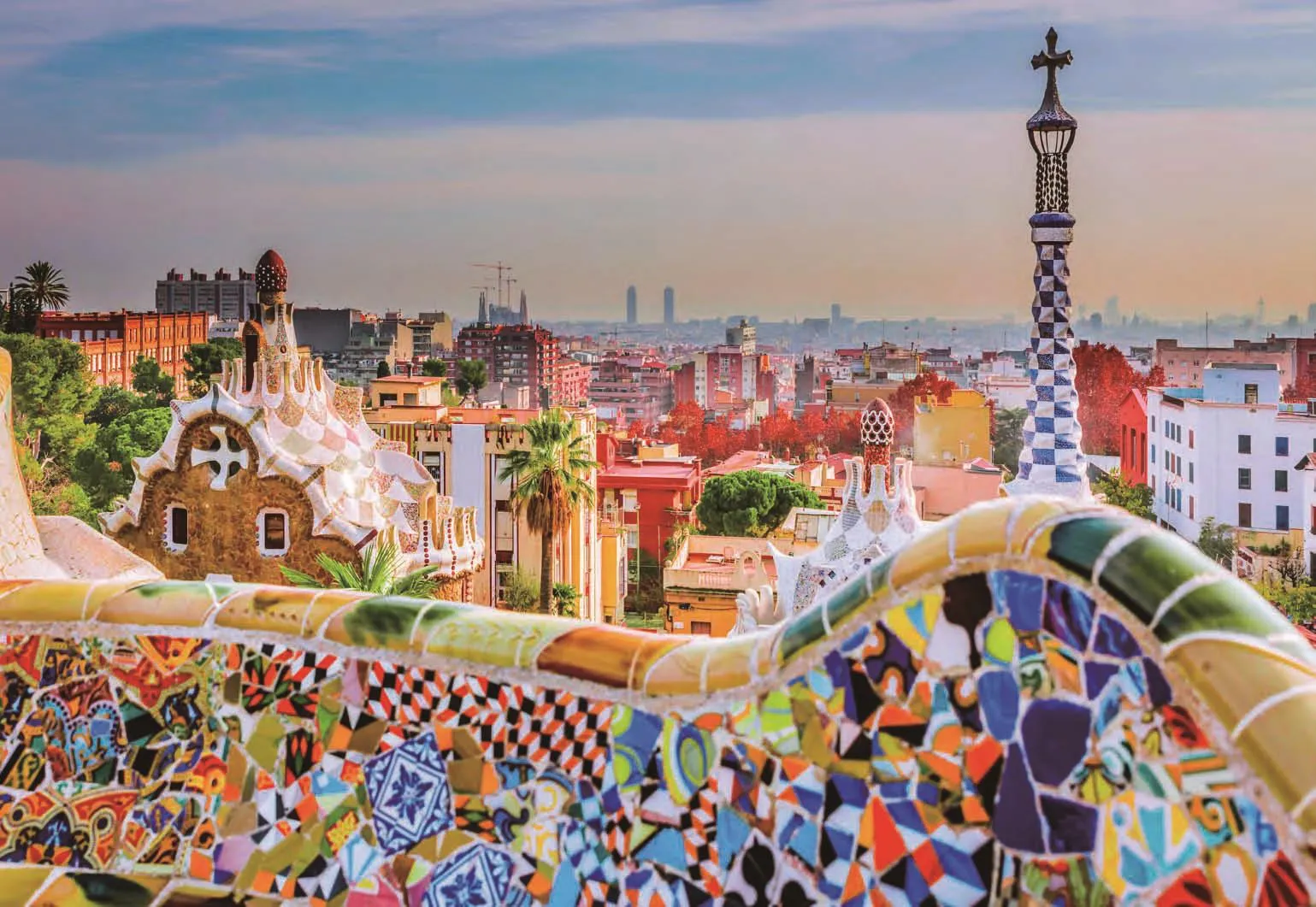The Moon Is Not Rounder Elsewhere
By Zeng Kai
I’ve lived in Spain for around four or five years, and truth be told, the Christmas here is very quiet and not how I thought it would be. On December 25,almost every house is shut up,which forms a stark contrast to the New Year’s celebration a week later.
Some people say that westerners are born independent and neither value their family nor give it a high priority in their lives.
Just a few days ago, I came across a middle-aged man at the bus station in front of my house.The man was standing there,looking around in the chill wind.After a while, a young lady came running from the other side of the street, and the old man was hailed with a most enthusiastic shout of “Papá” and a big bear hug from her in front of everyone. And then, the lady took the man by the hand, and both of them got in her car and left happily.
At that moment, it suddenly occurred to me that, ever since I reached manhood, I’ve never addressed my dad that way in public.
When I visited El Escorial, I was impressed by the centuryold elaborate drawing of Spain’s Royal Family Tree hanging on the wall, from which every single lineage of the royal clan could be traced back to hundreds of years ago. However, in China, many hectic urban dwellers seem to have forgotten the names of their ancestors that are older than three generations. In Spain, it is common to see handsome young dads wearing a knapsack stuffed with milk bottles on their back,pulling a pram, and carrying their babies in the front, all while shopping with their wives in the street. But in China, most babies seem to be looked after by their moms, grandparents, or nannies.
It seems that Europeans have a unique way of expressing when it comes to family values.In their minds, festivals for families should never be turned into a public carnival. If coming home is to fulfill your family responsibility, then coming home on Christmas is to fulfill the responsibility in the name of faith. When we communicate with people, everything we do is mundane, but when we communicate with God,everything we do is more like a ritual.
Before this Christmas, our dean had already scheduled to go back to her residence in the north to visit her children, my tutor had already set up a beautiful Christmas tree at home, and the supermarkets were shut early.With fireplaces burning cheerfully in every house, the family members, who are normally busy with their own affairs most of the time, are now sitting around the dining table, praying earnestly and devoutly in praise of Jesus Christ, and passing merciful blessings to everyone around them.
来到西班牙已经四五年,说实话,这里的圣诞节一直很平静,并不是我想象中的模样。每到这一天,家家户户都关起门来,和一周之后的新年狂欢形成巨大的反差。
有人说,西方人生来独立,不重视亲情,家庭观念淡薄。
前几天,我在家门口的公交车站,偶遇一位年过半百的老先生,他立于寒风中,四下观望。过了一会儿,从街道另一边跑来一个年轻女子,当着众人的面,大喊一声“爸爸”,扑上去就是一个温暖的拥抱,然后牵着老人的手,幸福地上了车。
那一刻,我突然想起,成年以后,自己好像从未在公共场合喊过“爸爸”。
参观埃斯科里亚尔修道院的时候,看到墙壁上挂着百年前精心绘制的家族树,一宗一亲都可以追溯到几百年前的各个支系。在中国,一些忙碌的城里人,已经记不得自己家族三代以上的名字。而在西班牙,经常看到很多年轻帅哥,推着婴儿车,胸前挂着婴儿,背包里塞着奶瓶,习以为常地跟在妻子身后逛街,但在国内,好多娃娃好像都是爷爷奶奶、妈妈、保姆带……

欧洲人的家庭观念或许有自己独特的表达方式,应该属于家庭的节日,就绝不是公众的狂欢。如果说回家是履行对亲人的责任,那么,在圣诞节回家,更是以信仰之名履行这份责任。当我们的交流对象是人的时候,所有的行为都是世俗生活;当我们的交流对象是神的时候,所有的行为更像是仪式。
我们的系主任早就计划回到她在北部的庄园去探望孩子,导师早就在家里制作好了圣诞树,商店早就打烊……家家户户的壁炉,烧得又红又旺,家人平时各自忙碌,现在围坐在餐桌旁,在对基督的赞美中庄严虔诚地祷告,再道一声祝福,传递给身边的人。
节日,是传统和习惯,是信仰和寄托,也是假期和商机。西方的圣诞节平静安详,东方的圣诞节喧哗亢奋。值得玩味的是,好多国人连苹果是“平安之果”还是“欲望之果”都没有分清楚,连天主教和基督教哪个拜耶稣、哪个拜上帝都还没弄明白,就已经煞有介事地庆祝起外国人的节日,模仿他们做祷告,学习他们送礼物,不亦乐乎……
我们的春节以及诸多传统节日的风俗习惯,已经流传千年,却似乎没有成为西方年轻人的精神寄托和模仿对象。是否,真的外来的习俗就那么洋,我们的传统就那么土呢?

Festivals are not only a tradition, a custom, a belief, and a spiritual support for us, but also a holiday and a business opportunity. Unlike the peaceful and quiet Christmas in the West,the Christmas in the East is rather boisterous and lively. It is worth contemplating why lots of Chinese people put on such airs in celebrating western festivals,imitating westerners to pray and exchange gifts and so on, without even understanding whether an apple represents peace or desire or who Catholics and Christians worship, God or Jesus Christ.
Yet, the customs of our Spring Festival and many other traditional festivals, with a history of thousands of years, are seldom imitated or much appreciated by young people in the West. Could it be said that foreign customs are trendy and ours are out of fashion?
I remember that a few years ago, I went to Havana to interview a film expert who was over 70 for my dissertation. He lived in a cramped and simply furnished house. After rummaging for some time, he took out a colorful iron box stuffed with all sorts of Chinese tea.
I was a little surprised by it,as Havana was a country under sanctions for several decades and in urgent need of food and sometimes even water and toilet paper. “This is Keemun black tea.This is Tie Guanyin (oolong tea).This is Biluochun (green tea).This is Pu’er (black tea)…” The old man introduced them to me as if talking about his family treasures.And then, he, full of pride, began to boil water and make tea for me.
Through the lingering vapor in the room, I saw that the old man squinted his eyes and took a sip of his tea. Then he exhaled a puff of warm air, and said to me happily, “I love the tea from your country. When I drink Pu’er, I can conjure up images of the horsedrawn caravans moving through clouds and mist on the Ancient Tea Horse Road, with horse bells ringing along the way. When I drink Tie Guanyin, I can conjure up images of petite young ladies from the coastland of Fujian,wearing tie-dyed headcloths and big bamboo hats, working in the field…”
Although he never had a chance to visit China, and I don’t know how much effort he spent in collecting those teas or where he got them, everything he said about the hometown of a tea was so vivid that I felt like I was actually there.
Perhaps, distance creates beauty as well as misunderstanding. When we get closer, we’ll find that, the moon is not rounder elsewhere.◆
(FromStay Hungry, Stay Foolish, Guangming Daily Press.Translation: Zhu Yaguang)
我想起好几年前,为了完成毕业论文,我去哈瓦那采访一个七十多岁的电影专家。他的房子非常狭窄,屋内设施非常简陋,主人翻了好半天,拿出一个花花绿绿的铁罐子,里面是各种中国茶。
我不禁有些吃惊,要知道,这是一个受到制裁几十年、物资紧缺到有时连纯净水和卫生纸都成问题的国度。老人如数家珍,向我介绍:“这是祁门红茶,这是铁观音,这是碧螺春,这是普洱……”然后,十分骄傲地烧好水、泡好茶来和我分享。
水汽缭绕之间,老人眯起眼睛,抿了一口茶,呼出一团热气,满脸幸福地说:“我喜欢你们的茶,一喝到普洱,就可以联想到茶马古道上踏着铃声在云雾间穿梭的马帮;一喝到铁观音,就能想象福建一带娇小柔美的女子,扎着花布头巾,戴着大斗笠,在田间劳作……”
他一辈子未曾有机会到过中国,我也不知道他究竟费了多少工夫,从哪里搜集来这些茶叶,他说的关于茶乡的这一切,感觉是那么形象,我也仿佛身临其境。
或许,距离产生美,也产生误解。当我们走近,便会发现,没有哪里的月亮更圆。◆

